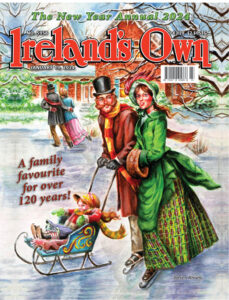He was on his way home when he ran into political activist and revolutionary Sean Mac Diarmada. Mac Diarmada said to him, “Dick, you can’t go away, we’re having a revolution on Sunday” – said as simply as if he were inviting a friend to a party. Mulcahy stayed. Hannah Huxley takes a look at the life of Michael Collins’ friend and right-hand man during the War of Independence … Waterford’s Richard Mulcahy
Ask the majority of Irish people who the first people that come to mind are when they think of the Easter Rising, the War of Independence, or the Civil War, and more than likely they will tell you that they are thinking of Michael Collins, Eamon de Valera, James Connolly or Pádraig Pearse.
The course of history has ensured that these names are etched in national memory, but there is a whole host of more central figures in the military and political evolution of the State who have been glossed over. Richard Mulcahy is one such figure.
Born at 70 Manor Street, Waterford, on 10 May, 1886, to post-office clerk Patrick and Elizabeth Mulcahy, Richard was one of eight children. He attended the Christian Brother’s School at Mount Sion in Waterford, and then attended the Christian Brother’s School in Thurles, where his father was transferred to in 1898. The family were not well off, and it was a result of their financial troubles which meant Mulcahy turned down a scholarship to Rockwell College and instead joined the post office at 16 years old in 1902 and worked in Thurles, Bantry, Wexford and Dublin.
Mulcahy joined the Irish Volunteers at the time of their formation in 1913 and was also a member of the Gaelic League and the Irish Republican Brotherhood.
 Mulcahy’s membership of the Gaelic League was unsurprising; his concept of nationalism was based on the preservation of the Irish language and the Gaelic tradition as an effective means of achieving independence.
Mulcahy’s membership of the Gaelic League was unsurprising; his concept of nationalism was based on the preservation of the Irish language and the Gaelic tradition as an effective means of achieving independence.
Mulcahy’s involvement in the Easter Rising, like many others who participated, was a last-minute decision.
His daughter, Elizabeth, explained that her father had come up the ranks in the Volunteers and on Holy Thursday was on his way home when he ran into political activist and revolutionary Sean Mac Diarmada.
Mac Diarmada said to him, “Dick, you can’t go away, we’re having a revolution on Sunday” – said as simply as if he were inviting a friend to a party.
Mulcahy stayed and on Easter Monday he cut the communications in Finglas (which was his task) and because he couldn’t get back into the city, he joined Thomas Ashe in Ashbourne and together they pulled off one of the rare military victories during the week.
However, it was Mulcahy’s role as Collins’ right-hand man during the War of Independence that catapulted him to legendary status.
The two first became closely associated when they were appointed to the Volunteer executive in October 1917.
As chief of staff, Mulcahy was Collins’ military superior, yet this did not impede on their budding friendship.
Collins and Mulcahy were together largely responsible for directing the military campaign against the British during the War of Independence.
Continue reading in this week’s Ireland’s Own


